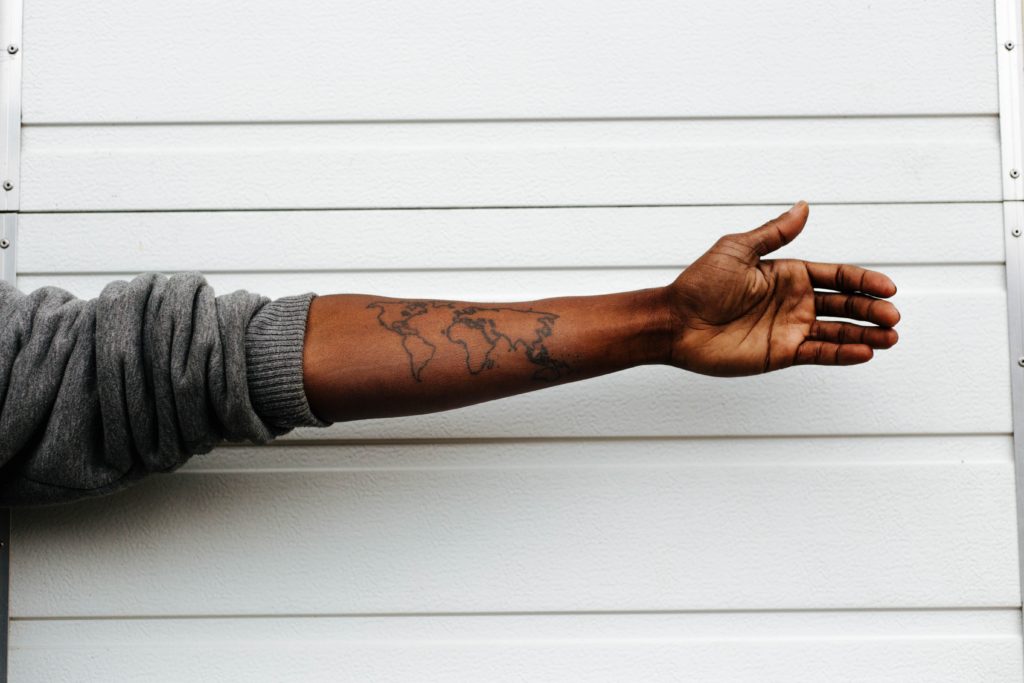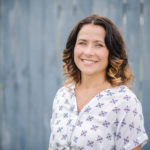
By Tatyana Claytor | Twitter: @TatyanasTable
We sat in their living room surrounded by a feast. Thin pastry-like crust stuffed with seasoned rice, meat, and cashews. Grape leaves filled with rice. Folded pockets of creamy chicken. We reclined on couches circling a large coffee table stacked with dishes.
The mother of this family explained with halted English how scary it had become in their homeland of Syria under the president, how they fled to Egypt and lived there for four years before finding passage to America. With sadness, she mentioned family who were still there, though she was grateful things had gotten better. When she left the room, our friend who knew the family well, mentioned her father had just recently died.
These were flesh and blood people in front of me. People who had a different culture and faith from mine, but people presenting the Imago Dei nevertheless. We came to be in their home that evening through an interesting chain of events that started with a hurricane and with a church’s decision to adapt to their changing city.
When Hurricane Irma came barreling down upon Florida in 2017, many Syrian families who had settled previously in West Palm Beach temporarily fled north into Georgia. While there, they found Clarkston, Georgia, the most ethnically diverse square mile in the United States. This place was chosen by our government to be a great location for the resettling of refugees.
Refugees, once they have been placed in a home, have three months of financial assistance to find a job and become self-sufficient. This is a daunting task for many who have limited English skills and are overwhelmed with a different culture and way of life.
This was also a distinct cultural shift for the people of Clarkston, finding it filled with people so different from them. For the original church inhabitants of Clarkston, a choice had to be made– either run from the changing world of their city or embrace this change as an opportunity to do missions without even leaving home. Clarkston International Church (CIBC) chose to do the latter. Their church built ministries based on the needs of the people–ESOL, job skills–while creating space for the Christians within these communities to worship.
It is this church that reached out to our Syrian friends and provided a refuge during Irma. Once the danger passed, however, our Syrian friends headed back home to Florida.
Unfortunately, the trip back did not go so smoothly. In the aftermath of Irma, there were food, hotel, and gas shortages and a curfew in West Palm Beach. Around the Florida border, this Syrian family wasn’t sure if they would have enough gas or food to make it back to West Palm before the curfew.
Our friends from CIBC called my husband, who is the youth and missions pastor of our church in Cocoa, Florida. They asked if we could help over thirty people by providing a place for them to stay and food to eat. Though our resources were limited due to the hurricane, our church rallied and assembled air mattresses, blankets, and a meal of spaghetti.
These experiences motivated this Syrian family to move shortly after to Clarkston, Georgia where they had felt love and care. Less than a year later, they cared for us on our youth mission trip to Georgia by providing a meal and sharing a glimpse into their own lives before becoming refugees.
The father was tall, with a dark complexion and a giant smile. He spoke no English and used the older of his two sons to translate. They, along with his wife and youngest son, ate in another room, leaving us to feast alone. However, they would occasionally stop in to see if we had any needs.
When we expressed interest in his home country, he proudly turned on the TV to show us videos of Syria before the war. Beautifully lit streets with cafes tumbling out of doors, chefs cooking ridiculously large meals, a countryside of rolling hills and bright flowers. I observed his face as he watched these videos, clearly longing for a time that had passed. I imagined what it might feel like to live in a foreign country and know my own country was in ruins.
Jason, a pastor from CIBC, came in halfway through our meal, and though he could not speak their language, the father’s face lit up when he saw him. His son was dutifully brought before Jason to translate his father’s requests. He was still looking for a job and had someone he wanted Jason to contact for him.
Jason also helped our youth group understand the experiences of people like our Syrian friends. One of the activities he did with the youth was called The Refugee Loss Simulation. He asked the youth to place the names of four important people in their lives on four separate cards. Then they wrote two things that are part of their identity (sports, music, etc) and the possessions they value.
The leader read a story of a typical refugee. Along the way, he asked the youth to give cards up, though sometimes he took the cards and they didn’t know what was taken. Finally, they looked at their cards to see what was left. All the students wept at the end.
For some, the hard decision of deciding to give up a loved one to save the others filled them with guilt. For others, having a card ripped away without knowing which one was taken filled them with dread. At the end of it, they related, in a tiny part, to the difficult decisions and repercussions of losing what is valuable to you that many refugees experience.
The youth thought differently about refugees after that. The next day as they worked with refugees in kids camps, home visits, or service projects, they were aware of the trauma of loss. They viewed these refugees through the lens of compassion instead of political rights and wrongs. This perspective enabled our youth to serve well. They took joy in teaching them about God’s character, sang songs with them, and played sports.
I’m amazed at the circular nature of God. Serving and being served, hosting and being hosted, blessing and being blessed. Our two summers of working with refugees at CIBC reminded us that the small decisions we make stretch beyond us in blessings upon blessings. We always have a choice–we can open doors or close doors–but the choice to serve is one we never regret.
About Tatyana:
 Tatyana Claytor is primarily a lover of story and truth. As an English teacher, she is surrounded by the stories of the ages, but as a lover of God, she is enveloped in the Story beyond all ages. Her desire is to know the Author of this story as clearly as possible that she might help others see God’s truth in their lives and His plan in their stories. She currently lives in Cocoa, Florida with her three story-loving children and her husband, a minister of Youth and Missions. She has a Master’s degree in Education from Nova Southeastern University and a Master’s degree in Professional Writing from Liberty University. You can find her at her website, www.tatyanastable.com, Facebook, and Twitter.
Tatyana Claytor is primarily a lover of story and truth. As an English teacher, she is surrounded by the stories of the ages, but as a lover of God, she is enveloped in the Story beyond all ages. Her desire is to know the Author of this story as clearly as possible that she might help others see God’s truth in their lives and His plan in their stories. She currently lives in Cocoa, Florida with her three story-loving children and her husband, a minister of Youth and Missions. She has a Master’s degree in Education from Nova Southeastern University and a Master’s degree in Professional Writing from Liberty University. You can find her at her website, www.tatyanastable.com, Facebook, and Twitter.
***
 The theme for August is “Homelessness, Refugees & the Stranger.” Follow along on social media (links in upper right) to keep up with the latest posts or sign up for the newsletter below for links to the most recent blog posts, thought-provoking articles from the web, and a few of the things I’m into these days.
The theme for August is “Homelessness, Refugees & the Stranger.” Follow along on social media (links in upper right) to keep up with the latest posts or sign up for the newsletter below for links to the most recent blog posts, thought-provoking articles from the web, and a few of the things I’m into these days.
Sign up for the (occasional) Mid-month Digest and the (loosely) “end of the month” Secret Newsletter for Scraping Raisins Here:
Photo credit: Photo by Fancycrave on Unsplash
Photo by Don Ross III on Unsplash


